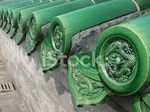| Tian Tan - East Entrance
Earth is represented by a square and Heaven by a circle; several features of the temple complex symbolize the connection of Heaven and Earth, of circle and square. The whole temple complex is surrounded by two cordons of walls; the outer wall has a taller, semi-circular northern end, representing Heaven, and a shorter, rectangular southern end, representing the Earth. Both the Hall of Prayer for Good Harvests and the Circular Mound Altar are round, each standing on a square yard, again representing Heaven and Earth.
The Seven-Star Stone Group, east of the Hall of Prayer for Good Harvest, represents the seven peaks of Taishan Mountain, a place of Heaven worship in classical China.
The Hall of Prayer for Good Harvests (祈年殿)
The Hall of Prayer for Good Harvests (祈年殿) is a magnificent triple-gabled circular building, 36 m (118 ft) in diameter and 38 m (125 ft) tall, built on three levels of marble stone base, where prayers are made for good harvests. The building is completely wooden, with no nails. The Hall of Prayer for Good Harvests has four inner, twelve middle and twelve outer pillars, representing the four seasons, twelve months and twelve traditional Chinese hours respectively. Combined together, the twelve middle and twelve outer pillars represent the traditional solar terms. All the buildings within the Temple have special dark blue roof tiles, representing Heaven. There are four main supportive, dragon pillars each representing a season. The structure, held up by these dragons, imitates the style of an ancient Chinese royal palace. Twelve inner pillars symbolize the lunar months, and it is thought that the twelve outer pillars refer to the twelve two-hour periods of the day.
The Vault of Heaven (皇穹宇)
The Vault of Heaven (皇穹宇) is a single-gabled circular building, built on a single level of marble stone base. It is located south of the Hall of Prayer for Good Harvests and resembles it, but is smaller. It is surrounded by a smooth circular wall, the Echo Wall, that can transmit sounds over large distances. The Imperial Vault is connected to the Hall of Prayer by the Vermilion Steps Bridge, a 360-meter-long (1,180 ft) raised walkway that slowly ascends from the Vault to the Hall of Prayer. The dome for this building also has no crossbeams to support the dome.
There are three paths along this bridge and three doors. The first path is known as the Noble path where the Nobles would walk in order to accompany the Emperor during the border sacrifice. The second path is known as the Imperial path which the Emperor would use to ascend to the Vault of Heaven. The third and final path is known as the Sacred path. In communist China to this day, the communist regime keeps the door to the Sacred path closed. Here in this temple to Shang Di, the door to the Sacred Path has been opened wide for all to enter who wish.
The Circular Mound Altar (圜丘坛)
The Circular Mound Altar (圜丘坛) is the altar proper, located south of the Imperial Vault of Heaven. It is an empty circular platform on three levels of marble stones, each decorated by lavishly carved dragons. The numbers of various elements of the Altar, including its balusters and steps, are either the sacred number nine or its nonuples. The center of the altar is a round slate called the Heart of Heaven (天心石) or the Supreme Yang (太阳石), where the prayers are made for favorable weather. Thanks to the design of the altar, the sound of the prayer will be reflected by the guardrail, creating significant resonance, which is supposed to help the prayer communicate with Heaven. The number nine is evident in the design of the Circular Mound Altar: a single round marmor plate is surrounded by a ring of nine plates, then a ring of 18 plates, and so on for a total of nine surrounding rings, the outermost having 9×9 plates.
[ edit ]
|
